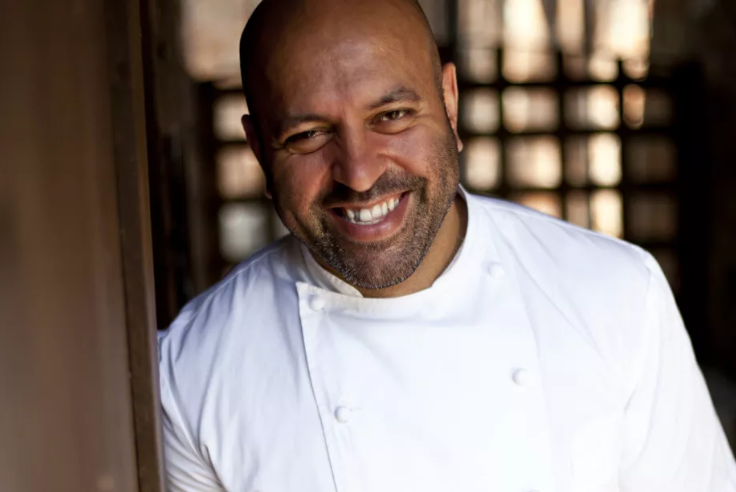
With Sat Bains, what you see, read and hear about him is what you get in person. It’s the same story online, which you’ll know if you follow him on social media. How often is that the case these days, especially when it has never been easier to create a more palatable digital alter-ego?
A brief summary of his career to date. Born in Derby, Sat Bains completed a catering course at Derby College before working under Mick Murphy. Inspired by his passion for food, then later by Marco Pierre White’s seminal cookbook White Heat, he decided that the sky was the limit, going on to work for Raymond Blanc and L’Escargot in Oxford and London respectively. In 1999, he won the coveted Roux Scholarship, which led to a stage at the three Michelin-starred Le Jardin des Sens in Montpellier, France. On his return to Nottingham, he took up the head chef role at Hotel des Clos, which became Restaurant Sat Bains in 2002. His first Michelin star was awarded the following year, and the second in 2011. In this lengthy but insightful interview, we talk about Sat’s heritage, his previous and current lifestyles, plagiarism and stupidity.
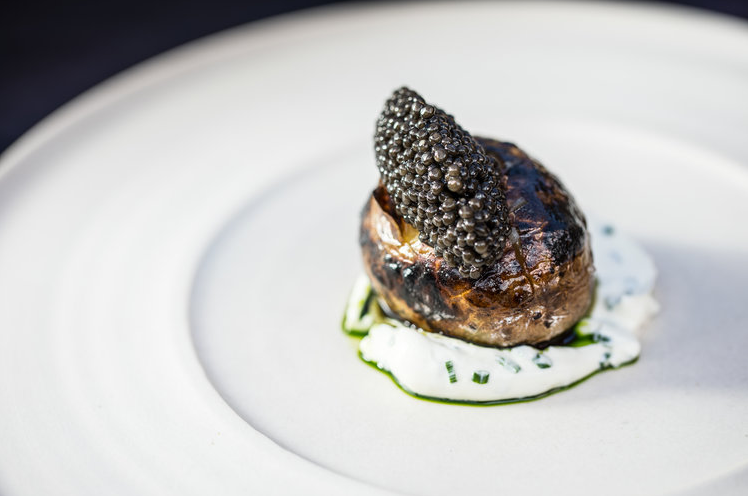
On Desert Island Discs, filmmaker Gurinder Chadha said, “It’s interesting being the child of immigrants because you carry their struggles with you, but also their pride.” As a first-generation Brit of Sikh heritage, what are your thoughts on this statement?
I don’t have great male role models in my family: my granddad escaped from prison in India and went to Malaysia, my dad and grandma followed before coming to England, so it isn’t the true path to Punjab. My dad’s biological dad died when he was 21, so my dad never really knew him. My dad’s uncle married the wife, as they did back then. I therefore don’t have a strong tie to Sikhism, and it’s not because I’m a coconut; when I was growing up, my parents spoke to me in English. I’m not close to anybody, and that’s not anyone’s fault, it’s just who I am.
I’d like to go to back to India for two weeks and explore Punjab to understand my roots, but that has nothing to do with my family. I want the experience to be purer, i.e. no family visits, so that I can define my own view of what a Punjabi man is. They’re traditionally warriors, which is what I am: I work in unchartered territories, I’m pushing my views across via food and am strong and genuine. I didn’t choose to be born here, but I’ve made the most of what I’ve got.
What’s the most interesting thing about you that we wouldn’t learn from your CV and interviews alone?
That I can’t swim. I love water, but I jumped into a pool when I was a kid before realising that I couldn’t swim, which was traumatic, so I’ve been wanting to fight through the fear ever since.
My goal was to learn by Christmas about six years ago, so I took 20-30 lessons. I loved the sessions, but by the end of the course, I’d only swum two lengths. I need some level of pressure to perform. As there was a deadline involved, I completed the course, but then never went back.
I like the idea of learning something that I’m not good at, like swimming and yoga, because it allows me to develop a new skill. It’s also a chance to better understand how to coach someone.
“The power of social media is ridiculous.”
If you were invited to speak about a topic totally unrelated to food, what would it be and what about it appeals to you?
The idea of creating something from nothing. It sounds crazy, but I don’t class myself as a chef: I’m just a creative guy and food is my medium. I wasn’t taught or mentored then worked with XYZ, which would’ve made me a certain type of chef. I’m a blank canvas; I have a fresher perspective.
You also have a deeper knowledge of ingredients because if you haven’t seen them before, you research them, cook them in different ways, consider their properties – fatty, salty, acidic, etc. – and how to pair them with other ingredients. It’s a liberating approach because I don’t know the rules and whether something is right or wrong. If it tastes good, it’s going on the menu.
If you could abolish one piece of modern technology, what would it be and why?
Mobile phones; they’re a fucking nightmare. Back in the day, we had Nokias and it’d take 20 minutes to text someone to say good morning. But now, I’ve got four email accounts, plus social media, so you can text me, tweet me, DM me, email me… Just call someone. But then when they do call, you think, “Fuck, what’s happened?” It’s here to stay, but it’d be good to recapture some of what we had. The power of social media is ridiculous, and everyone has an opinion.
Actually, I’d like to abolish fake reviews and people: if you haven’t got a registered account with a photo of yourself, you shouldn’t be allowed to say anything. Let’s abolish anonymity.
When people hear your name, what do you think is their first thought about you?
Some people pronounce my name wrong and think I’m French. I’ve got a Michelin-starred restaurant, so they’re surprised to see this lad from Derby with dark skin.
To be honest, I don’t think think about it. I’ve always just hoped that my name equals really good food, so when it comes up, I want the reaction to be, “Oh, my God, the food’s amazing.”
What’s your favourite thing about humanity and why?
I deal with people every day – customers, staff, suppliers, etc. – so I value human interaction and would hate to lose it. But when I’m on my own, I don’t want to talk to anyone apart from Amanda; we stay away from things on purpose. We’re accessible to everyone at work, but there’s a private side to us that no-one knows about. I’ll share the odd dish from home on social and I don’t mind that because it’s part of my job, but most of the time I won’t do it.
My pet peeve is stupidity. Some powerful people aren’t educated enough and have views which could affect lots of people. Education is key, both in life and academically: it makes you rise above others. Being stupid and close-minded stifles you because you’re missing out on so much.
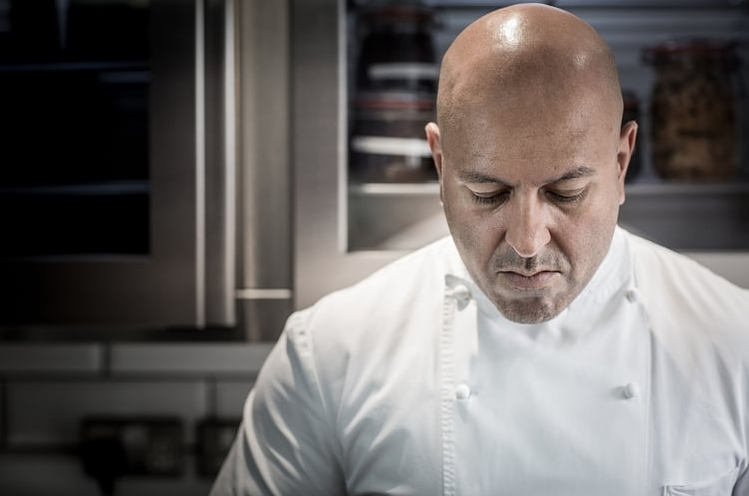
Reading Marco Pierre White’s White Heat opened your eyes to the world of fine dining. How did you discover it and how exactly did it inspire you to up your game?
I read a piece in the paper about him and his new book. I was working in a restaurant in Nottingham at the time, so I went into a second-hand bookstore and got a copy for £4 – bargain! As soon as I opened it, it just drew me in, especially Bob Carlos Clarke’s photos, and I thought, “What the fuck? This guy’s incredible.” All the black-and-white pictures of the food and his team, then you realise he has worked with the greatest, he had an exotic name – was it French or Italian? He was so mysterious, and we were all young, impressionable chefs. We’d fallen into this trade; none of us had planned to do it. When I read this, I just had to become a chef of this level.
He opened the door for working-class Brits and we saw that we could do much more than just frying chips in a hotel restaurant if we just applied ourselves. All chefs in their mid-40s now aspired to work for and learn from Marco Pierre White. On the book’s 25th anniversary, we were asked to write a paragraph in there and I thought, “Fuck me, this has come full circle!”
Kitchen life was glamorised a bit, but 99% of the stories are true. Chefs used to hit the drink, drugs and fags hard in those days. When you work from 7am until 1am, you might have 4 pints and 10 fags in your split shift break, do service and then head back to the pub to meet artists, creatives and dealers. Everyone else is asleep after a lovely meal, but that’s when the night owls come out, which is basically what chefs were in that era. We got shit pay, did mundane tasks, so our escapism was going to a bar and talking shit with people. You didn’t know any better, but then life moves on and you realise that it’s not a sustainable lifestyle.
“Chaos is a split second away every day.”
Things are different now. Amanda and I have more time off, which is amazing. I’m 48 now, so I don’t crave pub sessions anymore. I like the idea of giving your all in just four days, both to my team and customers, then we close around midnight on Saturday until Wednesday. I go home, have a coffee or glass of wine and drop my shoulders because I know that the restaurant is closed the next day. It’s the best feeling as nothing can happen: your staff or suppliers aren’t there; your customers and their expectations aren’t there; the team and the building have time to rest. Or you can have painters, decorators and plumbers coming in without being disturbed.
Giving the team a break is so important; on operational days, they work really hard. When Amanda first suggested it, I immediately thought about the loss of revenue. But it’s about being savvy: we condense the covers, so we’re busier and we hit it harder, but it means a longer break. We’ve got a high retention rate because we give our team a great work-life balance. If you’ve got a six-day operation, the team are just worrying about work on their day off, which affects their mental state. Closing for three days gives us physical closure and relief.
Which item or ritual do you never start service without and what does it represent for you?
I’ve got a station where I dress the plates and there’s always a pot of water with a spoon in it, and a Sharpie and pencil. That’s it. That’s my batterie de cuisine, which is the equipment you need for operation. If they’re not there, someone’s getting bollocked!
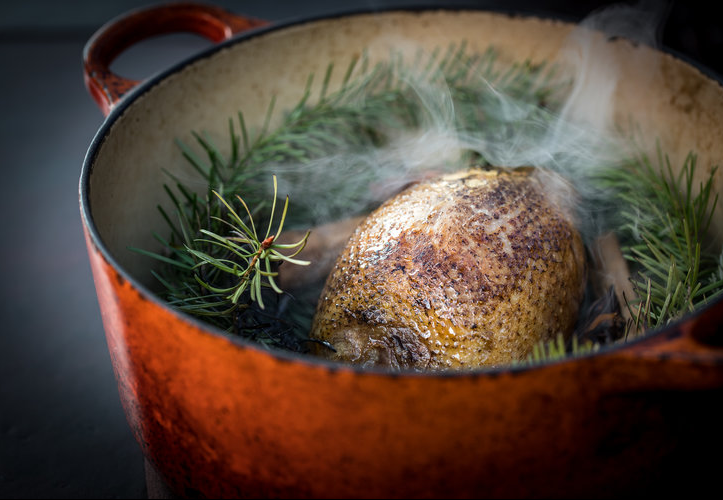
What makes your blood boil about the food industry right now?
Plagiarism is a bugbear. We all copy others, but what I’ve always tried to do is to give a nod to the source of inspiration, which is lacking with modern chefs. They’re ripping dishes off without adding “inspired by” and that gives credit where credit’s due. I’ve copied as well, but always said “inspired by Albert Adrià or Michel Bras” because it’s honest. Nowadays, I’m using more art references, like Anish Kapoor or Anna French. You can look at a visual and hide so many ingredients and subtleties through a painting because it doesn’t have any flavours of its own.
In terms of current trends, it’s all cyclical: they said tasting menus wouldn’t last, but they’re still going. I don’t have a problem with anyone doing anything if they love it. You can taste love: it’s an ingredient. When something is cooked well, you know someone put extra effort in, and that’s the secret ingredient in many kitchens. You can tell if they’re just going for the numbers; it’s systematic and boring. I’m often asked, “How do you stay relevant?” and the answer is by being honest and constantly pushing; we do not stop.
Being creative and striving to push boundaries can be a risky business. Have you experienced any kitchen disasters and if so, how have you overcome them?
All the time! Just last night, the chimney on our wood-fired oven broke and started spurting out soot during service and we had to get the engineers in. In restaurants, you deal with situations much quicker than in the average workplace. We’re used to a chaotic environment and so have very speedy reactions. When something goes wrong, we recover quickly. Unless you’re on the Chef’s Table or Kitchen Bench, you wouldn’t know. But chaos is a split second away every day.
Sometimes chefs panic due to lack of experience. If a chef has fucked a dish up, everyone else has to wait because several sections are working together to get that table out, which jeopardises the overall service. If they’re spinning out because they can’t recover, I’ll give them a short, sharp bollocking, which stops them from spiralling further and jolts them back into the moment. Then I start controlling their actions and physically take over their mind; this can take anywhere between two to 12 minutes. You have to be aware of what’s happening when it happens in order to address it straight away otherwise the entire service will be affected.
At RSB, we create chefs who excel in their field. Around 60 have gone through our kitchen over the past 20 years and they’re at the top of their game because we instilled this work ethic in them. We don’t let them get away with murder, cut corners or train cowboys. It’s hard, but they’re feeling the benefits of it, and hopefully they’ll make good money, become exec chefs or open their own restaurants one day. They may not thank you at the time, but later they’ll think, “That was a tough place to work, but they valued me and my craft. I’m not here to pussyfoot around and mollycoddle the team: I want to turn them into brilliant people. I train them to understand flavour and develop skills then when they reach senior level, I teach them how to manage a kitchen.
Which smell instantly transports you right back to your childhood and which memory is most strongly associated with it?
Spinach – my mum used to cook it in a pressure cooker, which stunk the house out and you could smell it down the street! But her saag was delicious. Drinking the original Lucozade takes me back; my grandma used to put salt in it as they did in Malaysia. And apples dipped in salt.
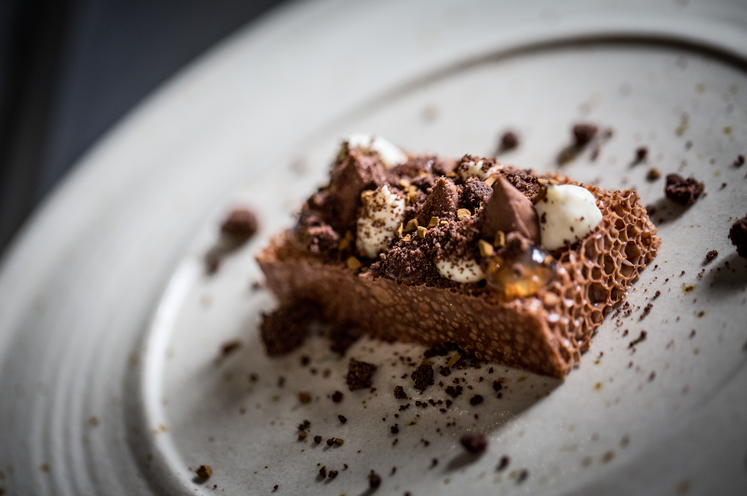
Do you still work closely with the University of Nottingham on sustainability projects? If so, how do you minimise food waste and your environmental impact at RSB?
We’ve done a lot of work with them in the past and everything we put in place has worked: low LED lighting, more sensors, composting. The latter is a closed loop system from Australia, which has saved us £16,000 a year on landfill charges. We put food waste into the machine, which cooks it at 65 degrees, extracts water and transforms it into a dry matter, like coffee grinds. It takes 3-6 months to become compost and we use that to grow produce in our garden. When I think back to what I started with and what we have now, it’s crazy!
One of the best things we did to increase efficiency was close for an extra day. Not being here for 20 hours saves so much water, electricity and gas, reducing our usage by 20%.
People don’t consider the whole picture when it comes to determining value. We did a survey and we’re the cheapest two-star restaurant in Britain. We offer 10 courses for £120 and each one is more than a bite. You can offer 20 courses, but if each course can be eaten in one go, it’s a fucking snack. People equate more courses with better value, but I disagree.
We’ve got 48 staff, including 4 sommeliers and 13 chefs, looking after 44 guests. This didn’t happen overnight: we’ve built this team to give our customers the best possible meal that we can afford and that costs money. I went to Paris recently and had a scallop dish in a brilliant two-star restaurant which was €180. For one course. You could have an entire tasting menu and a wine flight for that price at RSB and people have the cheek to call us expensive.
Diners taking photos and videos of their meal to share on social media and blogs is very common nowadays. How do you feel about this modern-day obsession?
I don’t care what people do so long as they pay for the food, eat it and enjoy it, even if it is cold. I don’t want to dictate whether they can or can’t take photos; that’s ridiculous. However, if someone was using a flash, we’d discreetly ask them to stop out of respect for the other diners. Ultimately, I don’t give a fuck provided that the dishes leave the kitchen as intended.
“You can taste love: it’s an ingredient.”
With public review sites like TripAdvisor and the increasing popularity of bloggers, everyone’s a critic. The former recently named RSB the best fine dining restaurant in the UK, but how do you respond to any negative feedback?
I don’t get involved. We have a formidable team, but if someone doesn’t like what we do, which does happen, we have to live with it. Unless they’re lying, it doesn’t make a difference to me. The positive reviews will always outshine the negative. People love negative comments because it makes them feel better about themselves. When you see a one- or two-star review, it’s juicy gossip and you can’t wait to talk about it; that’s human nature.
We’ve had complaints about our 72-hour cancellation policy, but it protects the business and is fair. If we sell the table, you get a refund. If you’ve had an emergency, like a bereavement, we won’t charge you; we’re not callous. But try the same thing at the theatre and they’ll say, “Fuck you.” We try our best, but we still get shit for it. I’d be pissed off to lose £500, but the policy is mentioned before you book and if you don’t read the email, that’s not our fault.
In an interview with The Guardian last year, you said, “My ambition is just for everyone who travels here to feel that they have eaten something really unique; that they know who I am through my cooking.” How would you describe who you are?
I’m a very firm but fair chef who enjoys the journey of creating some exciting food in the UK. It’s a brilliant time to be a chef now; these are the golden years for me in terms of the produce, professional pride, staff, well-travelled customers who know good food and wine. We also attract first-timers and we look after them as well; it’s very dynamic.
I was walking through the restaurant the other day and the atmosphere was amazing: we created that. I’m blown away by it because we’re under a pylon in a dodgy area of Nottingham, but people are eating and staying with us, laughing, joking and clinking glasses. When you take a step back and listen, it brings you down to earth. Everyone working here is driving towards a single goal, and there are so many moving parts, but when you hear that buzz, that’s the sound of success for me. It’s not a gastronomic temple where you’re shit-scared to talk or the chef is a dictator. Put your elbows on the table and take your shoes off if you want – I love it! Amanda and I both have working-class roots and will never tell anyone to put a suit on; dress codes are about the establishment wanting people of a certain ilk.
Links: Restaurant Sat Bains Review, Restaurant Sat Bains
PIN FOR LATER

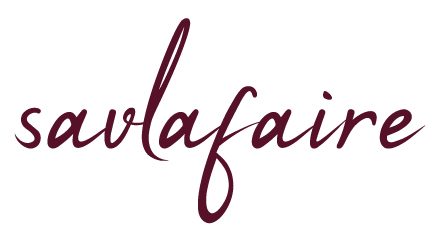
My dad was a huge fan of Sat Bains and always spoke about RBS and introduced me to his style of cooking. This has got to be one of my favourite interviews to date as I like the No-BS personality and just down-to-earth normality of Sat. Love the chilled out, no fussy attitude where the focus is most definitely on the food and service.
Really chuffed that you enjoyed the interview, Bejal, and your dad was clearly a man of very good taste. Speaking to Sat was so refreshing because he says what’s on his mind, which is so rare in an age of PR-friendly output. Also, you can’t fail to be motivated by his passion and drive to be the best at what he does.
What a fresh, frank and fascinating interview, Seetal. Loved it from start to finish. From the family stories to his ethos and inspirations – such an interesting read..
What an amazing and inspiring interview. However i remember when my boyfriend at the time wanted too impress me and it was early days in our relationship. He was so excited too be taking me somewhere special. He wouldn’t tell me where but it was for lunch. We ended up at your restaurant. We arrived in the car park and i noticed it was empty. But my boyfriend at the time said dont worry im sure we are just early. We then bumped into you. Ans you said really rudely we dont do lunch. And im busy. I will never forget the poor humiliating look on his face. This was about ten years ago. So hopefully things have changed. It did stay with me though.
This is a great interview and so down to earth and to the point! An inspiring man for sure. I so need to pay the restaurant a visit because all the food I have seen looks amazing..
Sat Bains is my food hero! He is always honest and upfront. In my opinion, one of the best restaurants ever!